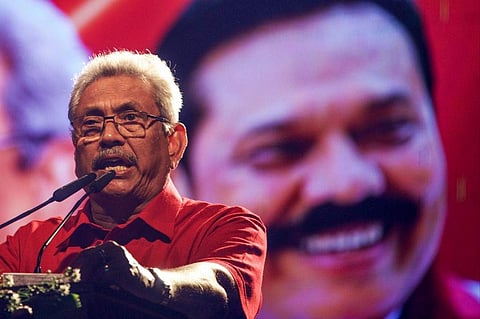

COLOMBO: The Sri Lankan Parliament on Monday passed the emergency regulations issued by President Gotabaya Rajapaksa on August 31 to control the prices of essential commodities and stop hoarding.
The regulations were passed with 132 votes and 51 against it.
The Opposition parties contested the president's move under Section 2 of Public Security Ordinance.
"The purported declaration of a state of emergency has been made in bad faith, with the ulterior motive of further wrongfully restricting the fundamental rights of the citizenry and moving further in direction of authoritarianism," main Opposition party, Samagi Jana Balawegaya charged.
President Rajapaksa declared an economic emergency last week to contain soaring inflation after a steep fall in the value of the country's currency caused by a spike in food prices.
The government had appointed a former army general as commissioner of essential services, with power to seize food stocks held by traders and retailers and regulate their prices.
Agriculture Minister Mahindanada Aluthgamage said the emergency regulations were published to tackle the food mafia.
The government denied there was a food shortage caused by the present import restrictions.
The government said hoarders were raided and essential items were confiscated under the new regulations in order to provide relief to the public during the current pandemic.
The emergency move followed sharp price rises for sugar, rice, onions and potatoes, while long queues had formed outside stores because of shortages of milk powder, kerosene oil and cooking gas.
The wide-ranging measure was also aimed at recovering credit owed to state banks by importers.
In the lead up to the emergency regulations being introduced the prices of most essential goods were skyrocketing due to the falling local currency and high global market prices driven by the COVID-19 pandemic.
The government blamed traders for hoarding.
The Sri Lankan rupee has fallen by nearly 7.5 per cent against the US dollar this year.
The Central Bank of Sri Lanka recently increased interest rates in a bid to shore up the local currency.
According to bank data, Sri Lanka's foreign reserves fell to USD 2.8 billion at the end of July, from USD 7.5 billion in November 2019 when the government took office and the rupee has lost more than 20 per cent of its value against the US dollar in that time.
Sri Lanka, a net importer of food and other commodities, is witnessing a surge in COVID-19 cases and deaths which has hit tourism, one of its main foreign currency earners.
Partly as a result of the slump in tourist numbers, Sri Lanka's economy shrank by a record 3.6 per cent last year.
The country is currently in a curfew till next week because of the spike in COVID-19 cases.
The coronavirus has claimed 10,140 lives along with 462,767 confirmed cases in the country, according to Johns Hopkins University.